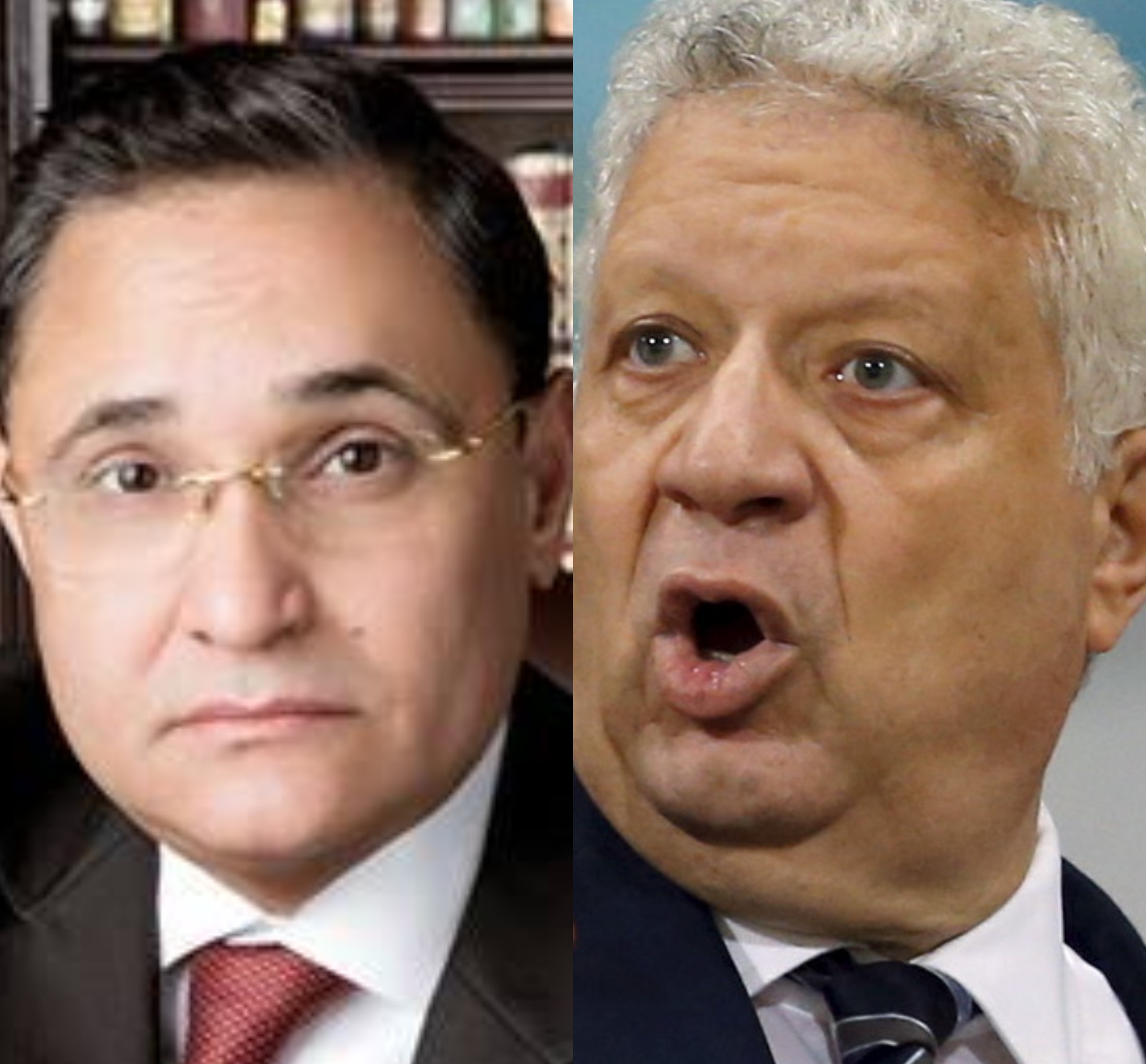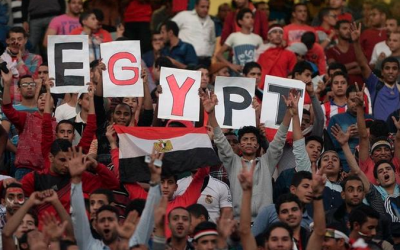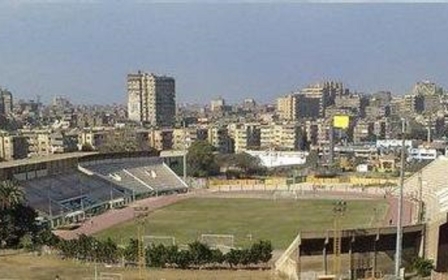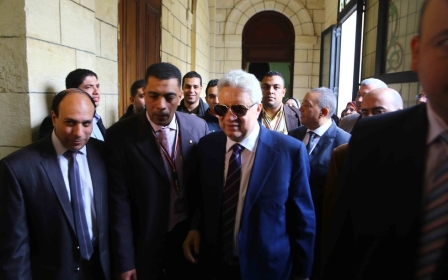Egyptian MPs' shock election losses show Sisi's support can be fleeting

Abdel Rahim Ali and Mortada Mansour have served as two of President Abdel Fattah el-Sisi's most devoted advocates in the Egyptian parliament - no mean feat in a body packed with his supporters.
So their loss in parliamentary elections held between 24 October and 8 November, widely considered rigged in the president's supporters' favour, has been received with shock in the country, and has raised questions about their security under Sisi's repressive rule.
Ali, chairman of the board at Arabic daily al-Bawaba News and director of the Centre for Middle East Studies think tank in Paris, ran as an independent in Giza province, which is part of the Greater Cairo region.
His loss to business tycoon Mohamed Abou el-Enein, owner of the Sada el-Balad television network and another strong backer of Sisi, was surprising to many.
'State authorities paid him back by making his election defeat possible, including by expanding the geographical area of his constituency to make him lose votes for competitors'
- Associate of Abdel Rahim Ali
More surprising still was the loss of Mansour, a lawyer and the president of Zamalek Sporting Club, one of Africa's biggest football clubs.
New MEE newsletter: Jerusalem Dispatch
Sign up to get the latest insights and analysis on Israel-Palestine, alongside Turkey Unpacked and other MEE newsletters
Mansour also ran as an independent, in the aluminium-making hub of Mit Ghamr in the province of Daqahlia, 150km northeast of Cairo.
The House of Representative polls, the second to be held after the 2013 ousting of late president Mohamed Morsi, were reportedly full of infringements, including vote-buying in some constituencies where voters traded their votes for either food parcels or money.
On Sunday, Egypt’s electoral commission announced the results of the second round of voting, showing the pro-Sisi Mostaqbal Watan (Nation's Future) Party in the lead.
With a voter turnout of only 29 percent, the party was declared the winner of all 284 seats allocated for party lists, while individual candidates won 59 seats of the other 284 allocated for independents.
Sisi can appoint 28 lawmakers directly, while the remaining individual seats will be decided in run-offs later in November and early December.
Ali and Mansour were among 50 sitting members of parliament and Sisi loyalists who lost the elections after running as independents, including House Spokesperson Salah Hasaballah.
However, the two men were the most famous and prominent among them, and had been attracting a lot of unwelcome attention ahead of the polls - which some analysts say signalled a desire inside decision-making circles to get rid of them.
"Some people were surprised at the election defeat of the two candidates, even as others saw it coming," Tarek Raslan, the chairman of the secularist Conference Party and a member of the Egyptian senate, told Middle East Eye.
Paying for mistakes
Ali, 57, is a diehard opponent of Islamists, including Egypt's largest opposition group, the Muslim Brotherhood. His think tank tries to function as a lobby group against Islamist charities, organisations and institutions in Europe, with a focus on France.
He has been a strong backer of Sisi's crackdown on Islamist organisations, and his TV show Black Box was notorious for airing recordings purportedly of Egyptian opposition figures, which always showed them in a negative light. The leaks scandalised the public and contributed to the opposition's plummeting popularity.
A few days before the elections, Ali got a taste of his own medicine when a phone conversation, allegedly of him and a court judge, who turned out to be his son-in-law, was widely shared on social media.
'The two MPs, especially Mansour, caused a lot of noise inside the parliament'
- Tarek Raslan, Egyptian MP
In the conversation, Ali said he is above the law and that the head of security comes to his house personally whenever he wants to file a complaint. He also threatened to reveal documents that could indict some more senior officials.
"The leaked conversation must have played a role in Ali's defeat, even as it is not the only reason for this defeat, because it was shared a very short time before the elections," Jihad Auda, a political science professor at Helwan University, told MEE.
Some people draw links between the leaked conversation and a longstanding row between Ali and Interior Minister Mohamed Tawfiq.
Ali has previously blamed Tawfiq's "wrong policies" for terrorist groups' raids on Egyptian police. In April 2017, he called for the interior minister's sacking and the restructuring of the ministry.
Yet a year later he praised the minister for keeping Egypt safe, favourably comparing security conditions to other countries such as Syria and Libya.
Nonetheless, Ali's biggest mistake was apparently his opposition to Egypt's handover of the two Red Sea islands of Tiran and Sanafir to Saudi Arabia.
Egyptians popularly perceive the islands as part of their country, but in June 2017 Sisi ratified a deal for the transfer of their administration to Saudi Arabia, a move opposed by much of the public.
"These positions must have had their influence on deciding Ali's political future," a close associate of Ali told MEE on condition of anonymity.
"State authorities paid him back by making his election defeat possible, including by expanding the geographical area of his constituency to make him lose votes to competitors."
Football politics
Mansour always puts himself at the centre of controversy.
Media appearances commenting on divisive issues are common for the 68-year-old: one time criticising a female singer for showing skin, another time lashing out at media anchors who criticise Sisi and his government from outside Egypt.
But it is in football, Egypt's most popular sport, where he has attracted the most notoriety in recent months. As Zamalek's chairman, he has picked fights with the boards of other clubs, particularly al-Ahly, by far Egypt's largest, most famous and most successful football club.
And Mansour has waged a very public battle with the ultras of his own team, the White Knights, vowing to have them arrested if they attend Zamalek's matches.
Mansour's disdain for ultra fan groups was not consigned to Zamalek's, however, and as MP he worked to disband them all, succeeding in getting a court ruling to this effect.
The ruling criminalises the formation of such fan groups, which he accused of implementing a political agenda that serves the interests of the opposition, especially when there is violence in stadiums.
This, observers said, has contributed to Mansour's failure.
"Mansour's conflicts with the fan groups played a role, even an indirect one, in his election defeat," the leading sports commentator Hassan al-Mistikawi told MEE.
Ramifications of loss
The election defeat of the two men - as well as others - has political ramifications for them, analysts said.
The loss also gives insights into the expected makeup of the next parliament.
Ali left Egypt immediately after learning of his election defeat. Some people working with him say he now lives in Dubai. Others say he is in Paris.
The same people do not expect him to return home any time soon, saying he has fallen foul of the interior minister.
His loss of parliamentary immunity also makes him vulnerable, they add.
Mansour, meanwhile, expects to go to court soon, especially with many of his rivals launching legal proceedings against him, including for libel.
"The parliamentary immunity is stipulated in all constitutions around the world," legal expert Salah al-Tahawi MEE.
"It aims to protect MPs against legal issues that can prevent them from carrying out their duties as representatives of the people, but this immunity ends with the end of the parliamentary membership."
Mansour is also at risk of losing the presidency of Zamalek, amid reports that the Egyptian government will appoint a military panel to manage the club until new elections for the club's board are held.
Ousting noisy MPs
There is apparently a desire inside decision-making circles for the formation of a new parliament that does not contain any of the problems of the outgoing one, including some loud-mouthed MPs, political analysts said.
True, Ali, Mansour and others who lost the elections were loyal to Sisi. Nonetheless, they could be irritating for his government.
"The two MPs, especially Mansour, caused a lot of noise inside the parliament," Raslan said.
It appears that the pair, alongside other losing Sisi loyalists, made the mistake of being overconfident and taking state support for granted.
In his leaked phone conversation, Ali said Sisi himself cannot send him for prosecution. Mansour was no less full of himself.
"Politicians lose a lot when they become arrogant and stop communicating with their constituents," Auda said. "This is why they fail in winning over these constituents, regardless of what they do."
Middle East Eye delivers independent and unrivalled coverage and analysis of the Middle East, North Africa and beyond. To learn more about republishing this content and the associated fees, please fill out this form. More about MEE can be found here.





